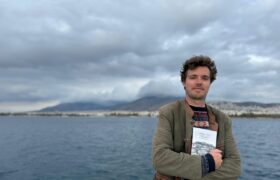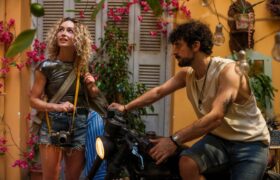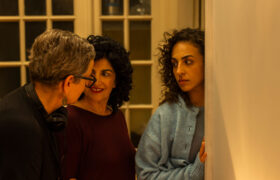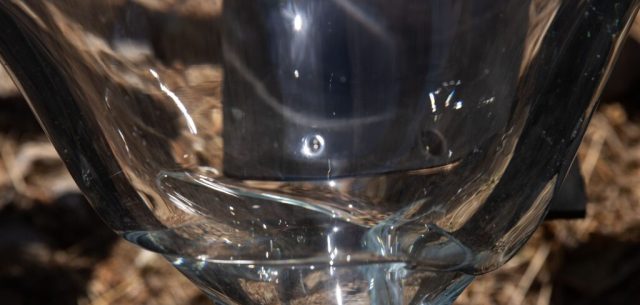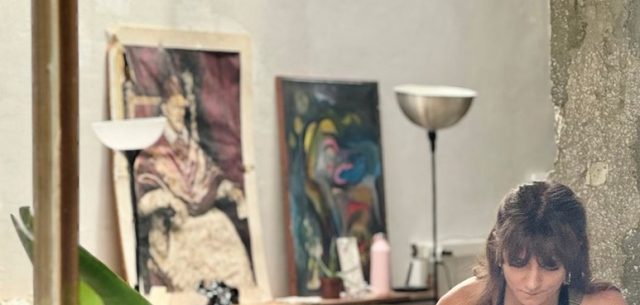A Playful Ode to A Difficult Dad
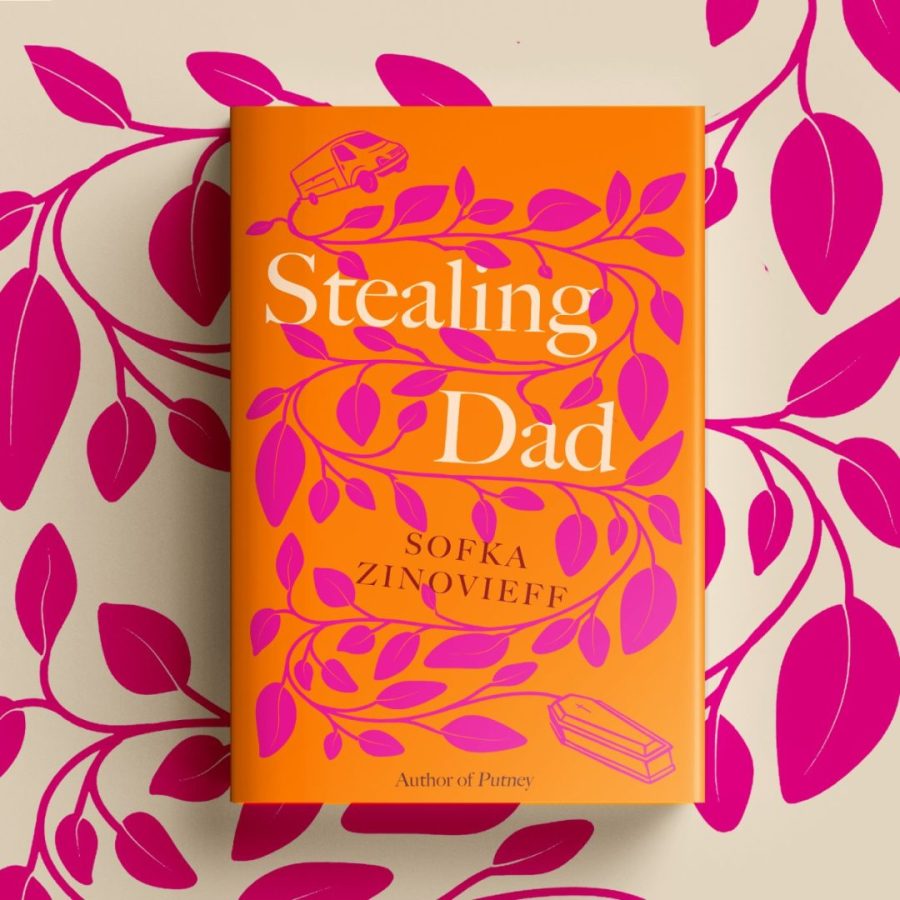
Rana Haddad interviews Sofka Zinovieff on the publishing day of her latest book, Stealing Dad, which tells the unlikely story of a dysfunctional family coming together in tragic yet hilarious ways. Part grief-memoir, part caper, Stealing Dad is a wonderfully written and sharply funny book that stems from emotional truth.
Sofka Zinovieff’s writing studio has its own entrance on the ground floor somewhere on the appropriately named Orpheus Street. Behind it is a staircase that winds upstairs to the apartment she shares with her Greek husband Vassilis, while behind some trees across the garden hides another small flat where her two daughters stay, when one or both are in Athens. This is an ideal set-up for a writer, I think.
“I cannot write a word, if anyone is in the vicinity, never have been able to! I tend to write in the morning and stop for lunch. If I don’t do it then, it doesn’t happen,” Sofka explains to me.
Once I step in, I’m blown away by the large rectangular room full of art and ornaments, with sweeping views of the Athenian coastline. It would be hard to believe that we’re in a suburb of a capital city. A large old desk sits in the far corner next to a small balcony brimming with plants. Clearly, as she writes and mulls over her plots and crafts her sentences, Sofka prunes and arranges her leaves and flowers in unpredictable formations. The same patience and imagination she applies to her words and plots I find in her plants and her taste in art (some by her), objects and paintings, each of which seems to tell yet another mysterious story. I want to ask her so many questions, but I decide to focus on the matter at hand: her upcoming new novel, Stealing Dad, which I recently read in one greedy gulp; a highly entertaining read, yet also rich and full of a rare kind of love and wisdom that goes against the grain of our times.
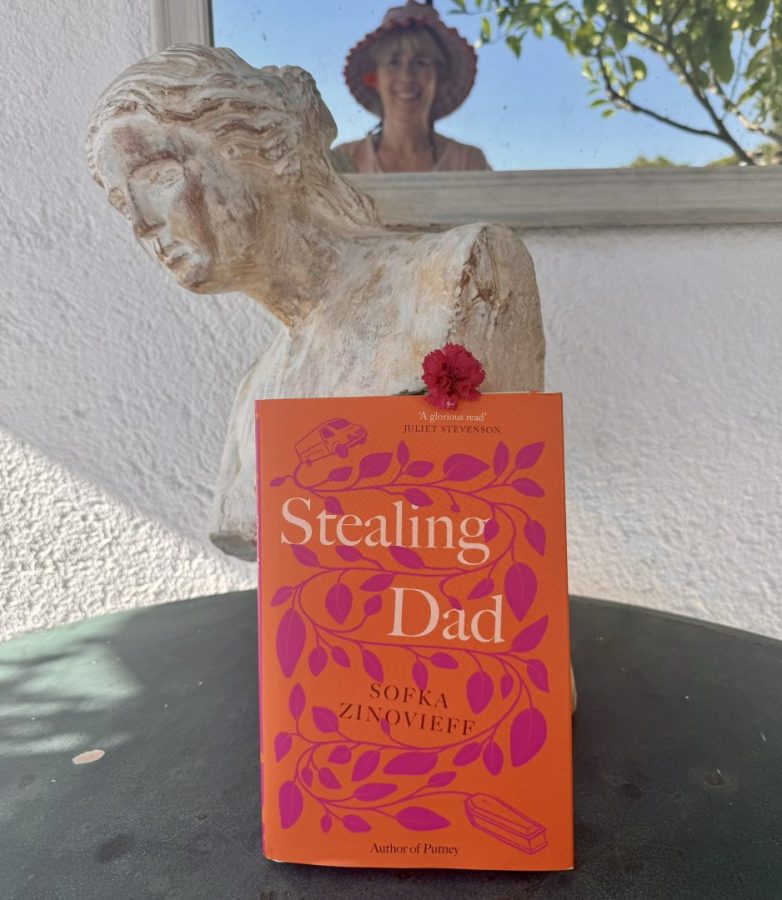
I’ve read many of her earlier books, and find her entire mindset as well as style very refreshing and unusual in its subtlety. Sofka lightens what is dark and softens what is hard without skirting around deeply troubling and thorny topics. While she makes us both some tea, I take out my notebook and jot down her answers to my questions. Circe the dog stares at me with curious eyes that look like they’ve been highlighted with a special canine eyeliner. She is clearly a very proficient writing companion and knows far more than she’ll ever let on.
First we talk about Sofka’s own father, the former geologist and engineer Peter Zinovieff, who out of the blue, some time in the 1960s, decided to teach computers how to compose music, something no one had ever attempted to do before. Eventually he developed the synthesizer, became a composer and his equipment was used by everyone who was anyone in the pop industry from Pink Floyd to David Bowie. Was he the inspiration behind the character of Alekos, the crazy Greek artist father-figure of her novel, and what was her relationship with him like?
“I always got on well with my dad and although this book was inspired by him, none of the events in the book describe my relationship with him.
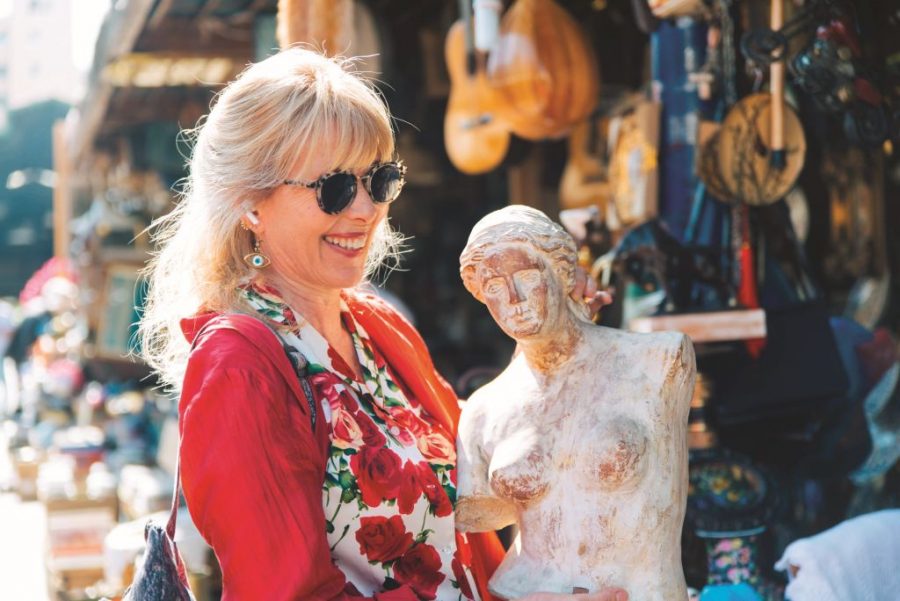
Sofka Zinovieff in Monastiraki. Pic by Thomas Gravanis
“My father was very easy to love but also very difficult. I was eleven when my parents separated and I lived with him. He was very lovable but he had a problematic side which could be hurtful to people. Women flocked to his side, an awful lot of girlfriends, and he was very wild, but that wasn’t a problem for me. As a child, you accept what life gives you. I saw my friends’ parents were different, but I didn’t mind. In the novel I exaggerate the problems and difficulties. I was the eldest and I was very close to him. He really inspired me. I’m able to balance his dark side because of how much inspiration he brought into my life. The chemistry between different people in a family is like the chemistry between people outside the family. You can’t force it. It exists or it does not. And I had that with my father and this helped me understand a person such as him.
My dad was very hands on, a terrible tease – but in my relationship with him I developed a sense of how love and affection could veer into danger, adventurousness, even in the physical world.
He’d take us scaling mountains, put us at great risk and leave us to find our way home, in the Hebrides during wild storms. But he’d set me a project to work on during the summer, things like drawing stage sets for an opera libretto he was working on, The Mask of Orpheus, or he’d say, ‘Why don’t you listen to all of Mozart’s operas and write down their stories and themes? Or write down a list of all the plants and herbs and flowers in the island and describe their characteristics’. We’d stay in a house without electricity or mod cons and be made to make bread, cook, camp and survive, often without much supervision.”
The Hebrides and Sofka’s strong relationship to that landscape and its rhythms and visions and layers of meaning feature in the novel, as well as the worlds of Athens and London.
“What about his last wife and widow? Was her decision to follow his will to its last letter the cause of the pain, which then led you to somehow write this novel as a sort of cure?” I ask.
“When he died and I learnt that he and his widow didn’t want his children to attend his funeral, it really was a big shock. David Bowie didn’t want a funeral. It isn’t unusual for some people not to want one. But the fact his widow wasn’t sympathetic to my and my siblings’ and half-siblings’ feelings became very painful. Initially, she didn’t want to even give us any of his ashes. It took her more than a year to give us some.”
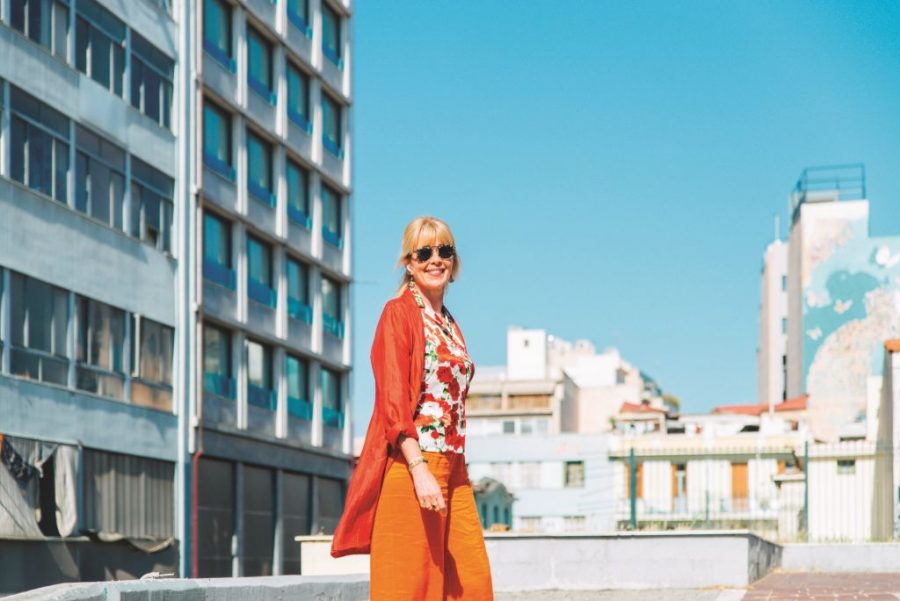
And how did you process this and how was it transformed into an actual novel and so quickly?
“It was during the pandemic and my siblings were very spread out. One in the Hebrides, one in NYC, one in Vancouver, and I was in Athens. We hadn’t all grown up together, and it was the first time we’d connected with one another all at once, and it happened virtually to begin with, over video calls. Our shared grief brought us together in a way that hadn’t ever happened in real life. We’d never gathered as a group of six. First three, and then a second lot of three born much later. My father’s third wife had been eighteen and he’d married her when he was in his fifties. Their son, my youngest half-brother, died from an overdose. We started meeting online and we had intense conversations. Then one day one of my half-sisters joked, ‘We’re going to have to organize a heist’ – our chats were beginning to become a mix of laughter as well as tears, both very close together. The thought stayed in my mind, ‘Yes, a heist!’ I wrote that in my notes. I was writing all of this down, every day, after we spoke. I was paralyzed. I couldn’t read books, something I always normally do but I was writing out my grief in notes.
“It was like a giant puzzle for me. ‘Why was it so upsetting not to go to the funeral?
How would a funeral change anything?’ As an ex-anthropologist I began to wonder whether the ritual itself helps people process their grief, to transition from one state to another. I imagined this ritual for my father and how it could be. I imagined scenes for the book in the parts of the world I love, including where I’d spent the most extraordinary periods of life with my father and some of my siblings, the Hebrides. Wild, untamed, elemental. I imagined everything that did not happen and could not happen, and I wrote it all down. And slowly the book began to emerge.
“It begins with the heist. This was the first scene I wrote,” Sofka tells me. “It also ends with all the assorted broken up siblings reconnecting, a new fabric of love knit together from something that had always been broken.”
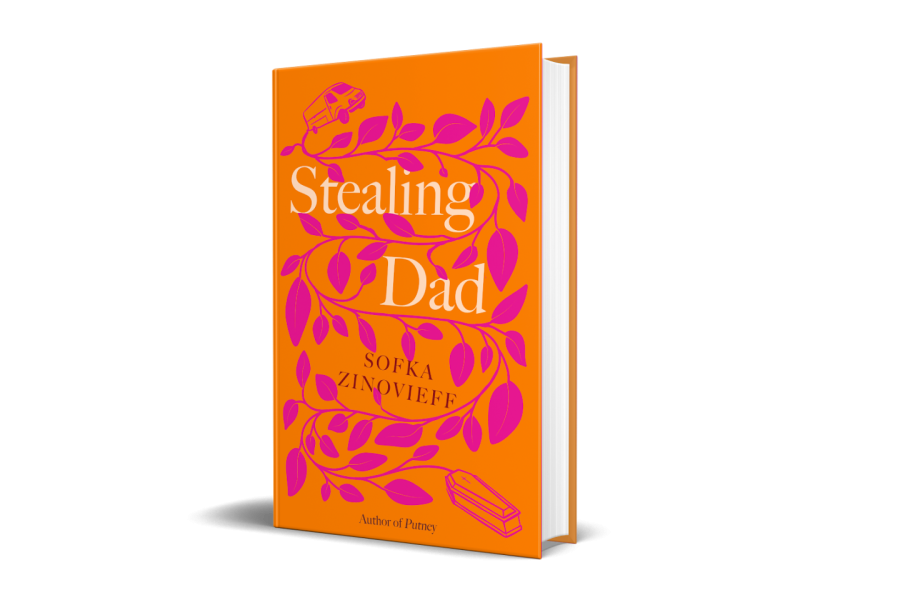
I mention how revolutionary it is of her at this time when it’s fashionable to blame one’s parents for one’s problems, and particularly self-centered patriarchs, to portray such a character as the fiery artist Alekos from Ikaria with such empathy and love.
“I like to find characters who are demonized by others and look deep into the other side of them, to understand them. Even though I’m a feminist and a mother of two feminist daughters, I can still love men with all their frailties and foibles. When I write about men who are seen by some as monsters (as I also did with the abuser of a young girl in Putney), I always remain strongly aware that they too are human. There has to be a conversation with those we don’t agree with, with those who hurt us and hurt others. Maybe I’ve had practice in this since childhood. My father was demonized by some, and so was my grandmother Sofka, who was a white Russian princess who arrived in the UK as a refugee from the Bolshevik revolution and then became a communist. She was the subject of my book Red Princess.”
It’s time for us to go and have lunch at the fish taverna down the hill, overlooking the bay of Vouliagmeni, where winter or summer Sofka swims with no fear of the cold. After all, her first swims as a child and teenager were in the chilly wild waters of the Hebrides.
“Stealing Dad, published by Corsair, Little Brown UK, 8thMay, 2025.” Save the date for Sofka’s book presentation on Insider’s terrace on September 30, 2025. sofkazinovieff.com


